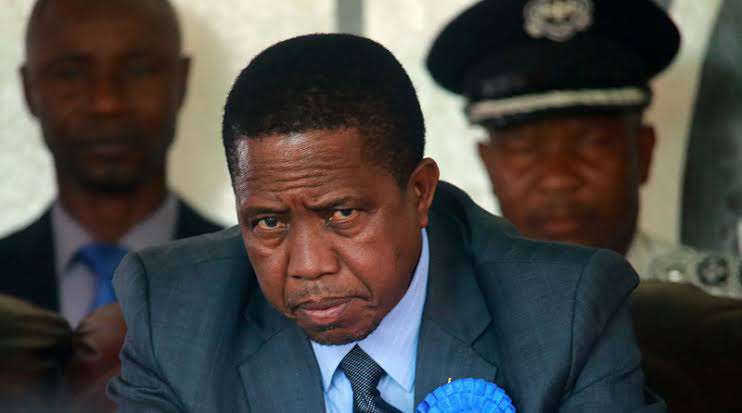Nation
Edgar Lungu, Former Zambian President, Dies at 68

Edgar Chagwa Lungu, Zambia’s sixth president and a towering figure in the country’s contemporary political history, has died at the age of 68.
His passing was confirmed on Thursday morning by his daughter, Tasila, who said the former leader died at a medical facility in Pretoria, South Africa, where he had been receiving treatment for an undisclosed illness.
Lungu’s death brings the curtain down on a turbulent, eventful public life marked by a rapid rise through the political ranks, a contentious presidency, and a dogged return to the political fray even after defeat and constitutional disqualification.
“In this moment of grief, we invoke the spirit of ‘One Zambia, One Nation’ – the timeless creed that guided President Lungu’s service to our country,” Tasila said in a heartfelt video message.
The illness that claimed his life remains unspecified, though Lungu had a known history of medical issues. A decade ago, while still in office, he underwent throat surgery abroad to address a narrowing of the oesophagus—an early sign of the health challenges that would quietly shadow his later years.
Born on November 11, 1956, Lungu’s early life followed a conventional path. He studied law at the University of Zambia, graduating in 1981, and later received military training at the Miltez army college in Kabwe. Before entering politics, he worked as a lawyer and held positions at Barclays Bank and Zambia Consolidated Copper Mines.
It wasn’t until 2011 that Lungu entered the national political spotlight, winning a seat in parliament under the banner of the Patriotic Front (PF). In short order, he became a key player within the ruling party, holding a succession of high-profile ministerial posts—including Justice, Defence, and Home Affairs—before ultimately emerging as successor to President Michael Sata following Sata’s death in 2014.
Lungu’s ascent to the presidency in January 2015 came after a bitter internal contest within the PF. He won a tightly fought by-election to complete Sata’s term, then secured a full five-year mandate in the 2016 general elections. In power, he presided over an era of ambitious infrastructure development, much of it funded through deepening ties with China. But the progress came at a cost. Zambia’s debt ballooned, unemployment soared, and frustration simmered among citizens battling rising living costs.
Though he maintained popularity in some quarters, Lungu’s government became synonymous with growing authoritarianism. Corruption allegations involving allies and relatives multiplied, even as Lungu publicly denied wrongdoing. His party’s youth wing was frequently accused of harassing political opponents, and media freedom came under increasing pressure.
His eventual loss in the 2021 elections was resounding. Hakainde Hichilema, a long-time opposition figure, defeated Lungu by nearly a million votes—ushering in a wave of optimism and change. In the aftermath, Lungu appeared to take a back seat, announcing his retirement from active politics. But it would not last.
By 2023, with Hichilema’s popularity beginning to falter, Lungu returned to the spotlight, rallying supporters and vowing to defend democracy. “I am ready to fight from the front, not from the rear,” he told cheering crowds. But legal hurdles soon dashed his ambitions. In late 2024, Zambia’s Constitutional Court ruled that he could no longer contest the presidency, having already served two terms—the constitutional maximum.
Despite this ruling, Lungu remained a thorn in the side of the ruling administration. He repeatedly accused the government of harassment, claiming that police tailed him, restricted his movements, and even blocked him from seeking medical care abroad. At one point, he alleged that his public jogging routines were being treated as acts of “political activism.”
Government officials denied placing him under house arrest, but the perception of persecution lingered.
Now, in death, Lungu leaves behind a complicated legacy—one that blends ambition, controversy, and undeniable influence. He was a man of sharp political instincts, described by those close to him as loyal, shrewd, and disciplined.
He is survived by his wife, children, and grandchildren.
President Hichilema, in a conciliatory tribute, called for unity in mourning. “Let us come together as one people, above political affiliation or personal conviction, to honour the life of a man who once held the highest office in our land,” he said.
As Zambia reflects on Edgar Lungu’s life, the nation must also reckon with the era he shaped—a chapter defined by both promise and polarisation.


